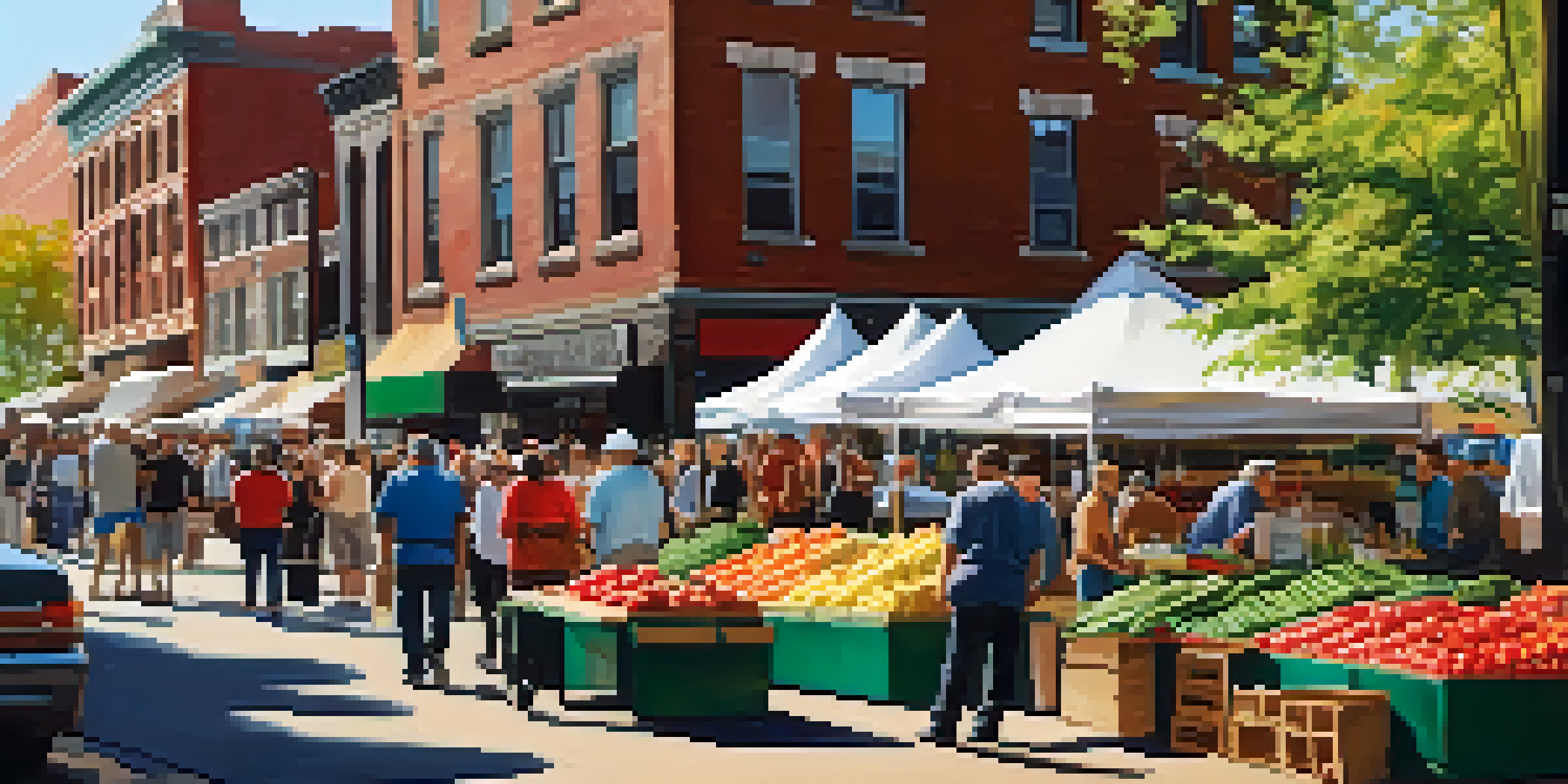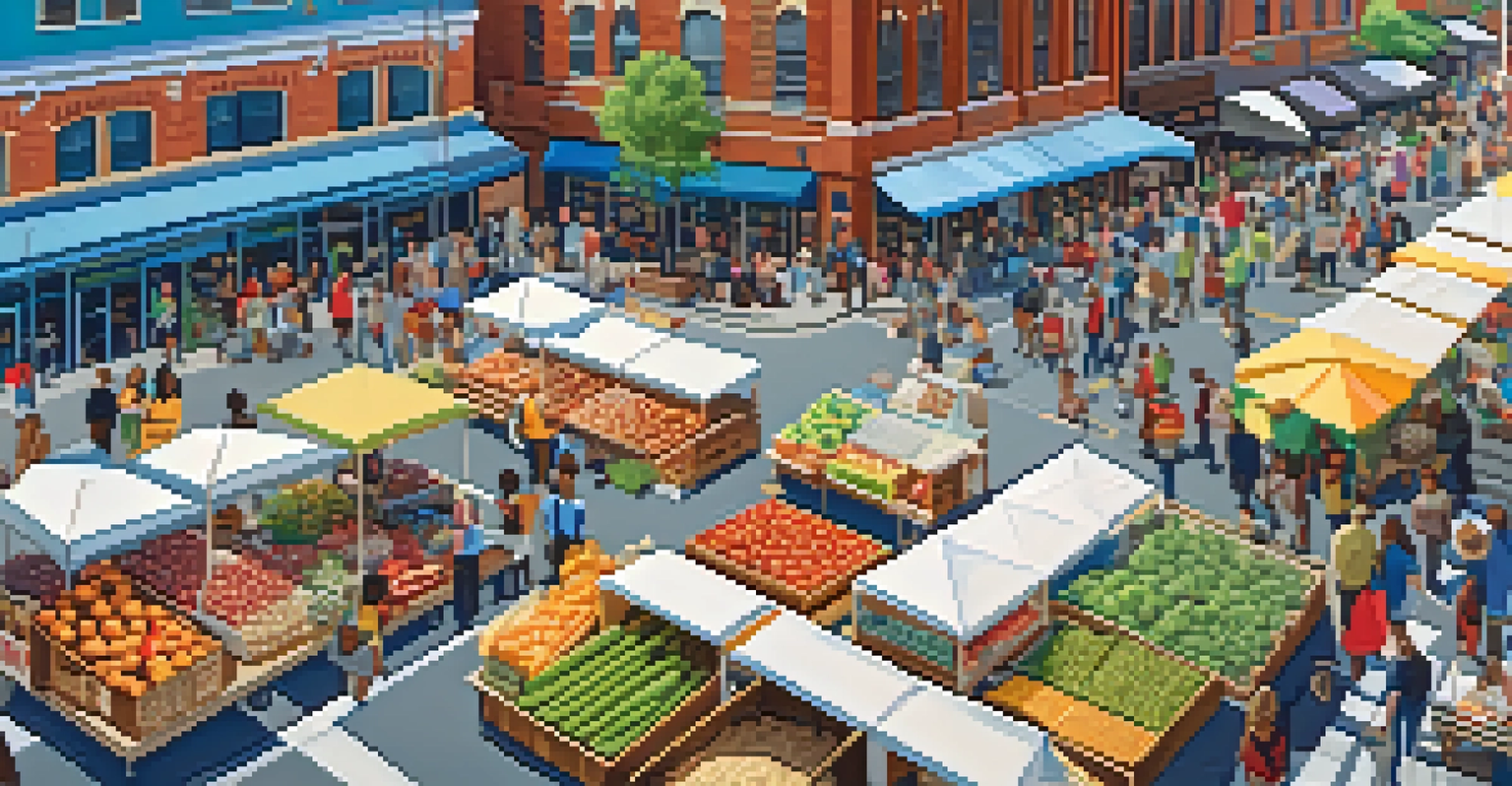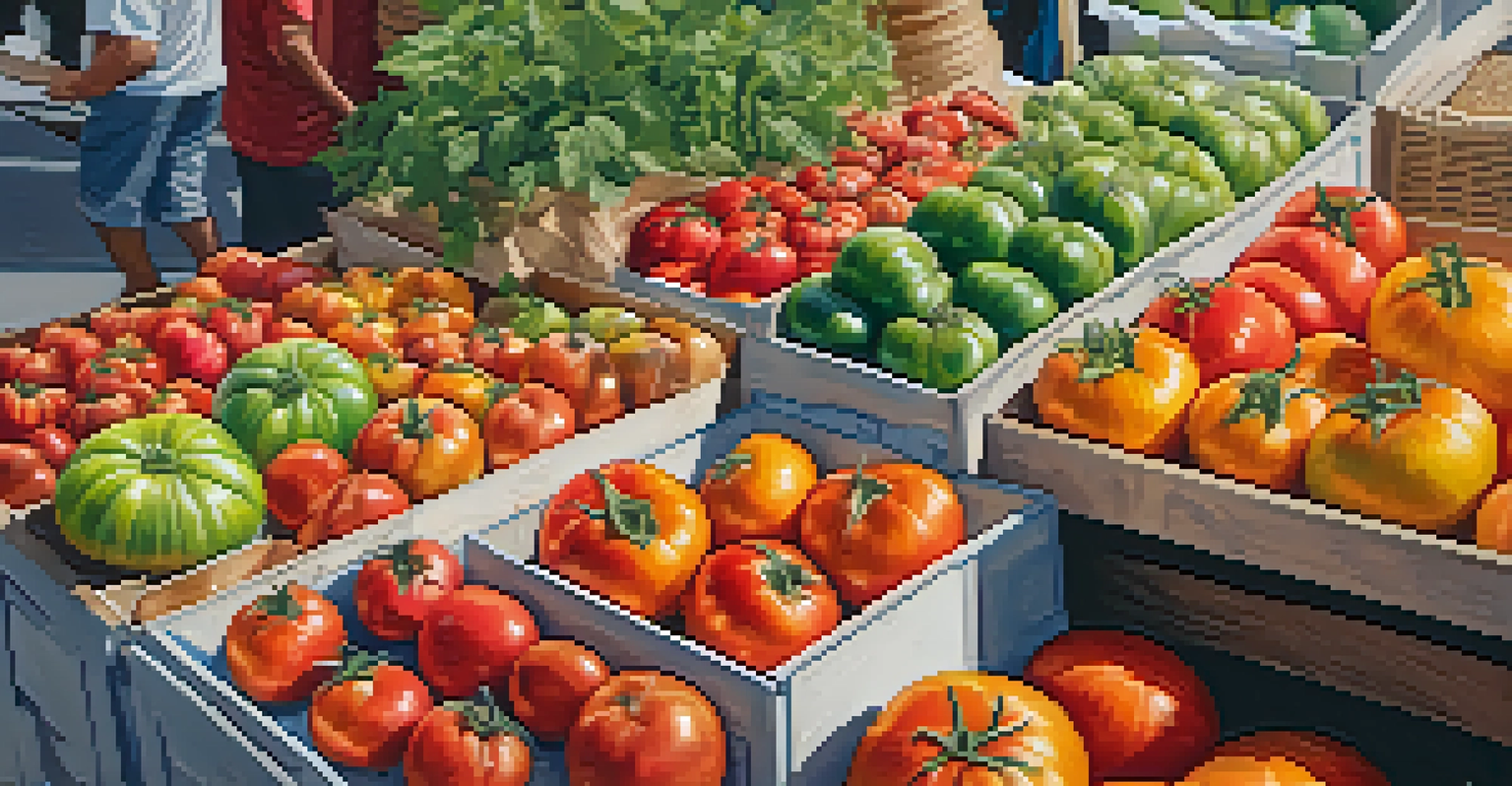The Role of Farmers' Markets in Philadelphia's Food Scene

A Brief Overview of Philadelphia's Farmers' Markets
Farmers' markets have become a staple in Philadelphia, providing fresh produce and local goods to residents. These markets offer a unique shopping experience, allowing consumers to connect with local farmers and artisans. With a variety of markets sprinkled throughout the city, there's something for everyone, whether you're a seasoned cook or simply looking for fresh ingredients.
Farmers' markets are a way to connect with our community and support local agriculture.
The charm of farmers' markets lies not just in the food, but also in the community vibe they promote. They often serve as gathering spots for neighbors to reconnect and engage in conversations about health, sustainability, and local economies. This social aspect fosters a sense of belonging and encourages shoppers to support local businesses.
In Philadelphia, the farmers' market scene is thriving, with options available year-round. From the bustling Rittenhouse Farmers' Market to the charming Headhouse Farmers' Market, each location offers a unique flavor of the city, showcasing the diversity in both produce and community spirit.
Nourishing the Community: Access to Fresh Produce
One of the key roles of farmers' markets in Philadelphia is to provide access to fresh, nutritious produce. Many neighborhoods, particularly those classified as food deserts, lack easy access to grocery stores that offer healthy food options. Farmers' markets bridge this gap, bringing fresh fruits and vegetables directly into communities that need them most.

These markets often feature a variety of organic and sustainably grown produce, which is not only healthier but also supports local farming practices. By prioritizing local sourcing, farmers' markets help reduce the carbon footprint associated with transporting food over long distances. This focus on sustainability resonates with many consumers who are becoming more conscious of their food choices.
Farmers' Markets Foster Community
These markets serve as vibrant hubs for social interaction and community building in Philadelphia.
Moreover, farmers' markets often accept various forms of payment, including SNAP benefits, making fresh produce accessible to a wider audience. This inclusivity ensures that everyone, regardless of economic status, has the opportunity to enjoy healthy food options.
Supporting Local Farmers and Artisans
Farmers' markets play a crucial role in supporting local farmers and artisans, providing them with a platform to sell their products directly to consumers. This direct-to-consumer model not only helps farmers earn a fair price for their goods but also fosters a relationship between producers and shoppers. When you buy from a local farmer, you're investing in the community and supporting sustainable agricultural practices.
Eating locally isn’t just good for your health; it’s good for your community.
Many farmers at these markets are small-scale operators who may not have the resources to distribute their products through grocery stores. Farmers' markets provide them with a viable outlet to reach customers who appreciate the quality and freshness of their offerings. This connection also encourages shoppers to learn about the farming process and the importance of supporting local agriculture.
Additionally, artisans who create handmade goods, such as cheese, baked goods, and crafts, benefit from the exposure that farmers' markets provide. These markets serve as incubators for small businesses, allowing them to gain recognition and build a loyal customer base within the community.
The Role of Farmers' Markets in Promoting Sustainability
Sustainability is at the heart of many farmers' markets in Philadelphia, with a strong emphasis on eco-friendly practices. By sourcing food locally, these markets reduce the need for long-distance transportation, which can significantly lower greenhouse gas emissions. This focus on local supply chains not only benefits the environment but also supports the local economy.
Many vendors at farmers' markets are committed to organic and regenerative farming practices, which prioritize soil health and biodiversity. Shoppers can feel good about their purchases, knowing they are supporting methods that contribute to a healthier planet. This awareness is increasingly important to consumers who are looking to make environmentally conscious choices.
Access to Fresh Produce for All
Farmers' markets provide essential access to nutritious food, particularly in neighborhoods that lack grocery stores.
Moreover, several farmers' markets engage in educational initiatives that teach the community about sustainable practices. Workshops and demonstrations on topics like composting, gardening, and cooking with seasonal ingredients help foster a greater understanding of the food system and its impact on the environment.
Creating a Culinary Hub: Farmers' Markets and Local Chefs
Philadelphia's farmers' markets have become a culinary hub, attracting local chefs who seek fresh, seasonal ingredients. Many chefs frequent these markets to source high-quality produce, meats, and artisanal products for their restaurants. This relationship not only enriches the dining scene but also highlights the importance of local sourcing in food preparation.
By collaborating with farmers' markets, chefs can create menus that reflect the seasons and celebrate local flavors. This connection fosters a deeper appreciation for the ingredients and encourages diners to explore new dishes that showcase the best of what Philadelphia has to offer. It's a win-win situation for both chefs and farmers, as it promotes a farm-to-table ethos.
Additionally, some markets host special events or chef demonstrations that further bridge the gap between agriculture and culinary arts. These events allow shoppers to learn how to prepare dishes using seasonal ingredients, enhancing their cooking skills while promoting a love for local food.
Building Community Connections through Farmers' Markets
Farmers' markets are more than just places to buy food; they are vibrant community hubs that foster connections among residents. Whether it's chatting with a vendor about their products or bumping into a neighbor, these markets create opportunities for social interaction and community building. This sense of togetherness is especially important in urban settings like Philadelphia, where people may feel disconnected.
Many markets organize community events, such as live music, cooking classes, and family-friendly activities, which encourage participation and engagement. These events not only entertain but also educate the public about healthy eating and the benefits of supporting local businesses. As a result, farmers' markets become spaces where community spirit thrives.
Support for Local Farmers
By connecting consumers directly with local farmers and artisans, these markets promote sustainable practices and fair pricing.
Moreover, the relationships formed at farmers' markets can lead to collaborations and initiatives that benefit the wider community. Local organizations often partner with markets to promote health initiatives, nutrition education, and food access programs, further solidifying the market's role as a cornerstone of the community.
The Future of Farmers' Markets in Philadelphia
As Philadelphia continues to evolve, so do its farmers' markets. The growing interest in local food systems, sustainability, and health-conscious eating habits suggests that these markets will remain an integral part of the city's food landscape. Innovations such as online ordering and home delivery, which some markets are beginning to implement, are making it easier for consumers to access fresh produce.
While challenges such as climate change and economic fluctuations may affect local agriculture, farmers' markets have the resilience to adapt and thrive. By fostering strong relationships within the community and supporting local producers, these markets can continue to play a vital role in shaping Philadelphia's food culture.

Looking ahead, the future of farmers' markets in Philadelphia is bright, with opportunities for growth and expansion. As more residents recognize the importance of local food systems, these markets will likely attract even more visitors, further enriching the city's culinary scene and community engagement.